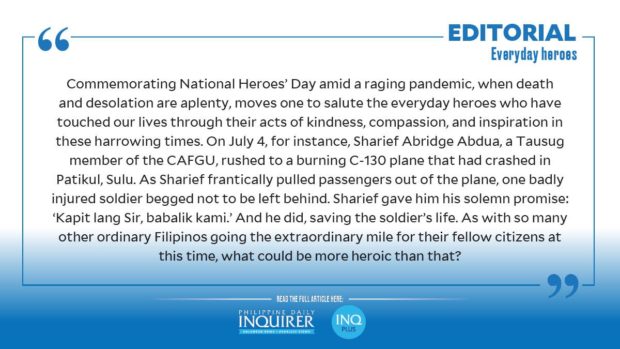Everyday heroes

Commemorating National Heroes’ Day amid a raging pandemic, when death and desolation are aplenty, moves one to salute the everyday heroes who have touched our lives through their acts of kindness, compassion, and inspiration in these harrowing times.
These ordinary people reflect the virtues of the larger-than-life patriots and warriors of our history books whose courage and sacrifice forged the country’s destiny as an independent nation, and whose example continues to hold relevance to the nation’s fortunes today.
There’s Maria Theresa Cruz, 47, a nurse from the Cainta Municipal Hospital, whose story encapsulates the sad plight of our health care workers — underpaid, overworked, and most vulnerable to the virus.
Though she had comorbidities, Cruz told her daughter she could not shirk her responsibilities at the hospital where she had been working for nine years. “This is my sworn duty and I pity my colleagues because only two of them will be on duty,’’ she said.
Cruz got infected with the virus and died on July 22. But her sacrifice became even more tragic when her daughter claimed her pay at the hospital. The nurse was expecting at least P30,000 in hazard pay—P500 per day as promised by the Department of Health for 60 days of service at the front lines.
Instead, her daughter got P7,265, equivalent to a shocking P60.93 special risk allowance per day.
Like Cruz, obstetrician-gynecologist Dr. Anne Mimay-Magkasi went on serving at the Diosdado Macapagal Memorial Hospital in Pampanga even if she could not be vaccinated as she was pregnant. She succumbed to COVID-19 on July 28, along with her unborn child, leaving her family and colleagues grieving over her ultimate sacrifice. “Ganoon talaga kasi siya, sakripisyo sa trabaho niya,’’ her coworker Dr. Donald Reluya said.
Cruz and Mimay-Magkasi are among the 103 Filipino health frontliners who have died of COVID-19 in the line of duty since the pandemic started.
Patricia Non became a household name—and the target of vile administration partisans—when the 26-year-old started a community pantry along Maginhawa Street in Quezon City on April 14, offering free food to poor people anchored on a powerful idea: “Magbigay ayon sa kakayahan, kumuha ayon sa pangangailangan.’’ As government support for the destitute and those displaced by the economic crisis had come in trickles, thousands soon lined up before Non’s small cart. That singular act of kindness sparked a movement, eventually counting some 7,000 community pantries all over the country and even abroad, serving hundreds of thousands of hungry Filipinos.
In Antique, because of the lockdown, graduating students of the Lawigan Elementary School in the town of Tobias Fornier could not experience the important milestone in their young lives. “My students don’t have cell phones because they’re poor. Even if we have a virtual graduation, it will be useless because they will not be able to see or hear it,’’ teacher Rosalina Sarguino told the “Kapuso Mo, Jessica Soho” TV program.
So Sarguino and her fellow teachers improvised, deciding to bring the graduation rites to their students. With a mobile stage bedecked in balloons and pulled by a carabao, the teachers trekked for hours on a rainy day to the remote mountain villages of their 13 graduating Grade 9 and kindergarten students, to give them the chance to experience graduation—one the kids will surely never forget in their lifetime.
And how can one forget food delivery riders? At no time is their service more needed and appreciated than during these nearly two years that the country has been under lockdown. Intrepid, tireless delivery riders have not only afforded countless households the convenience and security of ordering for their food and basic needs but they have also kept many food establishments afloat. Yet these riders — braving the elements and the risk of contracting the virus — are, like health workers, still fighting for their recognition and benefits as employees of food delivery apps.
Lifting a tired, troubled nation up was what weightlifter Hidilyn Diaz accomplished when she won the country’s first-ever gold medal in the Olympics, giving pandemic-weary Filipinos a glorious moment of pride. Together with boxers Nesthy Petecio (silver), Carlo Paalam (silver), and Eumir Marcial (bronze), these lionhearted Olympians gave the Philippines its most bountiful Olympic finish yet.
On July 4, Sharief Abridge Abdua, a Tausug member of the Cafgu, rushed to a burning C-130 plane that had crashed in Patikul, Sulu. As Sharief frantically pulled passengers out of the plane, one badly injured soldier begged not to be left behind. Sharief gave him his solemn promise: “Kapit lang Sir, babalik kami.’’ And he did, saving the soldier’s life. As with so many other ordinary Filipinos going the extraordinary mile for their fellow citizens at this time, what could be more heroic than that?





















